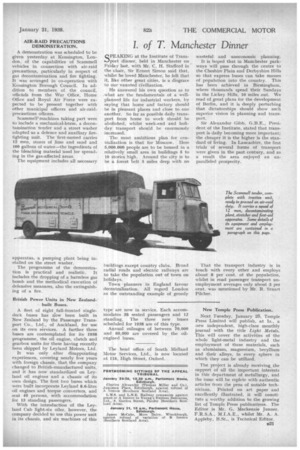1. of T. Manchester Dinner S PEAKING at the Institute of
Page 7

If you've noticed an error in this article please click here to report it so we can fix it.
Transport dinner, held in Manchester on Friday last, with Mr. C. H. Stafford in the chair, Sir Ernest Simon said that, whilst he loved Manchester, he felt that it, like other great cities, is a disgrace to our vaunted civilization.
He answered his own question as to .what are the fundamentals of a wellplanned life for industrial workers, by saying that home and factory should be in pleasant places and close to one another. So far as possible daily transport from home to work should be abolished, whilst week-end and holiday transport should be enormously increased.
The most ambitious plan for centralization is that for Moscow. Here 5,000,000 people are to be housed in a relatively small area in buildings 5 to 10 stories high. Around the city is to be a forest belt 5 miles deep with no buildings except country clubs, Broad radial roads and electric railways are to take the population out of town on holidays.
Town planners in England favour decentralization. All regard London as the outstanding example of grossly wasteful and uneconomic planning.
It is hoped that in Manchester parkways will pass through the centre to the Cheshire Plain and Derbyshire Hills so that express buses can take masses of population into the country. This has been achieved in Birmingham, where thousands spend their Sundays in the Lickey Hills, 10 miles out. We read of great plans for the development of Berlin, and it is deeply perturbing that dictatorships should show such superior vision in planning and transport.
Sir Alexander Gibb, G.B.E., President of the Institute, stated that transport is daily becoming more important; the cheaper it is the higher is the standard of living. In Lancashire, the first trials of several forms of transport were given in the past century, and as a result the area enjoyed an unparalleled prosperity.
That the transport industry is in touch with every other and employs about 8 per cent, of the population, whilst in road passenger transport unemployment averages only about 3 per cent, was mentioned by Mr. R. Stuart Pilcher.






























